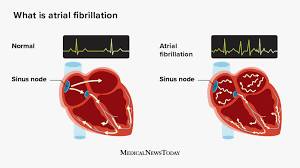Certainly, let's explore atrial fibrillation (AFib), including its causes, signs, effects, and solutions.
**Causes of Atrial Fibrillation (AFib):**
1. Age (risk increases with age)
2. High blood pressure (hypertension)
3. Coronary artery disease
4. Heart valve disorders
5. Cardiomyopathy
6. Heart attack (myocardial infarction)
7. Heart surgery
8. Chronic lung diseases
9. Sleep apnea
10. Excessive alcohol consumption
11. Thyroid disorders (hyperthyroidism)
12. Obesity
13. Diabetes
14. Family history of AFib
15. Smoking
16. Chronic kidney disease
17. Certain medications (e.g., stimulants, some asthma drugs)
18. Stimulant drug use (e.g., cocaine)
19. Pulmonary embolism
20. Infections (e.g., pneumonia)
**Signs and Symptoms of Atrial Fibrillation (AFib):**
1. Irregular and rapid heartbeat
2. Palpitations (feeling of strong, fast, or irregular heartbeat)
3. Fatigue
4. Shortness of breath
5. Chest pain or discomfort
6. Dizziness or lightheadedness
7. Fainting (syncope)
8. Weakness
9. Anxiety
10. Reduced exercise tolerance
11. Confusion or difficulty concentrating
12. Swelling in the legs, ankles, and feet (edema)
13. Bluish skin or lips (cyanosis)
14. Elevated neck veins
15. Nausea
16. Increased risk of stroke
17. Increased risk of blood clots
18. Heart failure
19. Reduced quality of life
20. Mental health issues (anxiety, depression)
**Effects of Atrial Fibrillation (AFib):**
1. Irregular heart rhythms (arrhythmias)
2. Increased risk of stroke
3. Blood clots, which can lead to stroke or other organ damage
4. Heart failure
5. Decreased cardiac output
6. Chest pain and discomfort
7. Reduced exercise capacity
8. Impaired organ and tissue perfusion
9. Fatigue and weakness
10. Increased risk of heart attack
11. Reduced kidney function
12. Liver problems
13. Gastrointestinal issues
14. Pulmonary edema (fluid in the lungs)
15. Frequent hospitalizations
16. Impact on daily activities and work
17. Risk of sudden cardiac arrest
18. Reduced sexual function
19. Elevated healthcare costs
20. High risk of death if not managed effectively
**Solutions and Management of Atrial Fibrillation (AFib):**
1. Medications (e.g., anti-arrhythmics, anticoagulants)
2. Lifestyle changes (e.g., weight management, healthy diet)
3. Regular exercise as advised by a healthcare provider
4. Rate control strategies
5. Rhythm control strategies (e.g., cardioversion)
6. Catheter ablation
7. Surgical procedures (e.g., maze procedure)
8. Left atrial appendage closure to reduce stroke risk
9. Anticoagulation therapy to prevent blood clots
10. Emotional and psychological support
11. Support groups and education
12. Cardiac rehabilitation
13. Dietary supplements (under medical guidance)
14. Reduced stress
15. Smoking cessation
16. Avoiding excessive alcohol
17. Treating underlying causes (e.g., hypertension, diabetes)
18. Sleep apnea management
19. Regular follow-up with a healthcare provider
20. Genetic counseling for familial AFib
Atrial fibrillation is a complex condition, and its management should be tailored to the individual's specific needs and underlying causes. Consult a healthcare professional for accurate diagnosis and personalized treatment.



No comments yet
Be the first to share your thoughts!